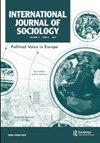The Political Sociology of Voting Participation in Southern Africa: A Multilevel Study of Regional and Social Class Predictors in 11 Countries
IF 1.1
Q2 SOCIOLOGY
引用次数: 1
Abstract
Abstract Voting participation constitutes and legitimatizes electoral democracy. However, research has been unable to predict and explain the lack of participation across political contexts. The present study aims to predict voting participation based on regional predictors using 11 countries from the Afrobarometer (2019). For the analysis, the study uses modern measurement models and Bayesian multilevel logit models (binary and categorical). The regional analysis suggests that a greater frequency of experiencing bribery predicts lower voting probabilities. Regions with citizens who are more highly educated predict lower voting probabilities for deciding not to vote. Regions with higher levels of skilled craft workers predict lower voting probabilities. Compared to those in the lower occupational social class, citizens in the higher occupational social class have a lower voting probability. The study concludes by offering implications for the relational approach to contentious politics and democratization.南部非洲投票参与的政治社会学:11个国家的区域和社会阶层预测因子的多层次研究
投票参与构成了选举民主并使之合法化。然而,研究一直无法预测和解释在政治背景下缺乏参与。本研究旨在利用非洲晴雨表(2019)中的11个国家的区域预测因子来预测投票参与情况。本研究采用现代测量模型和贝叶斯多层logit模型(二元和分类)进行分析。区域分析表明,经历贿赂的频率越高,投票概率就越低。在受教育程度较高的地区,选民决定不投票的概率较低。熟练工艺工人水平较高的地区,投票概率较低。与较低职业社会阶层的公民相比,较高职业社会阶层的公民投票概率较低。该研究的结论是为有争议的政治和民主化的关系方法提供启示。
本文章由计算机程序翻译,如有差异,请以英文原文为准。
求助全文
约1分钟内获得全文
求助全文

 求助内容:
求助内容: 应助结果提醒方式:
应助结果提醒方式:


